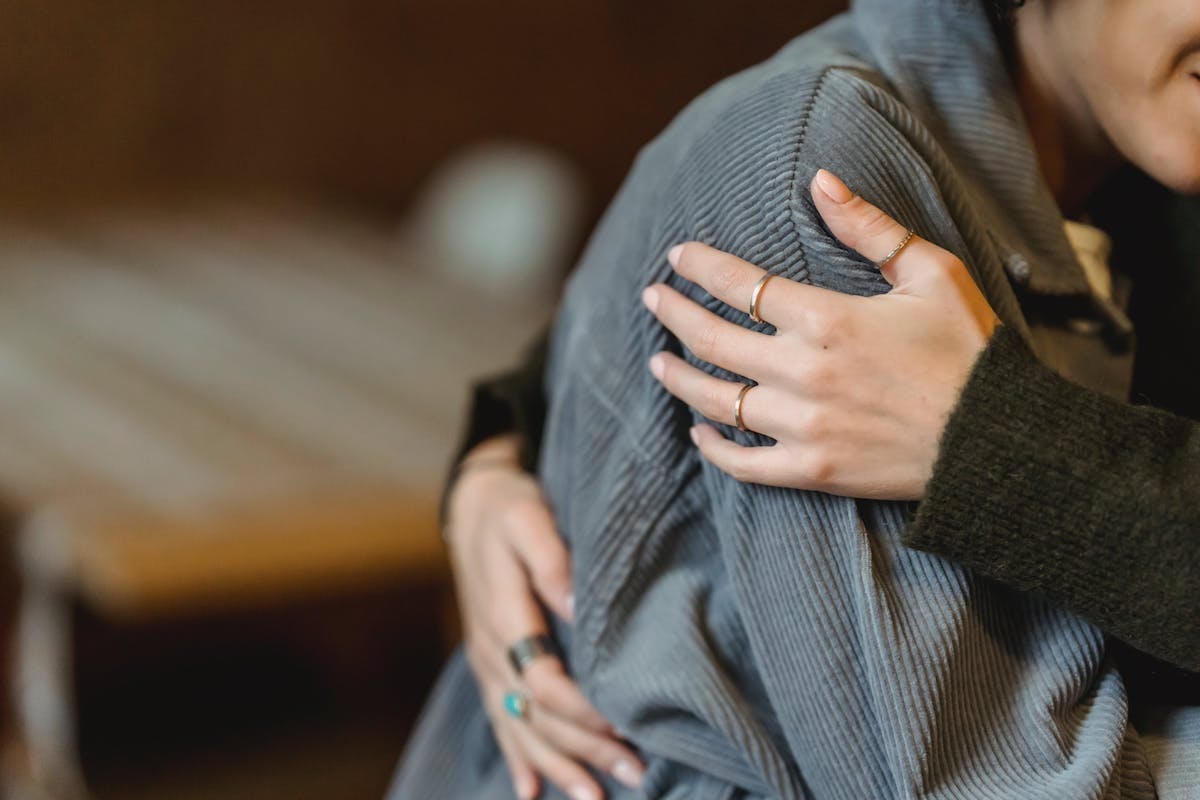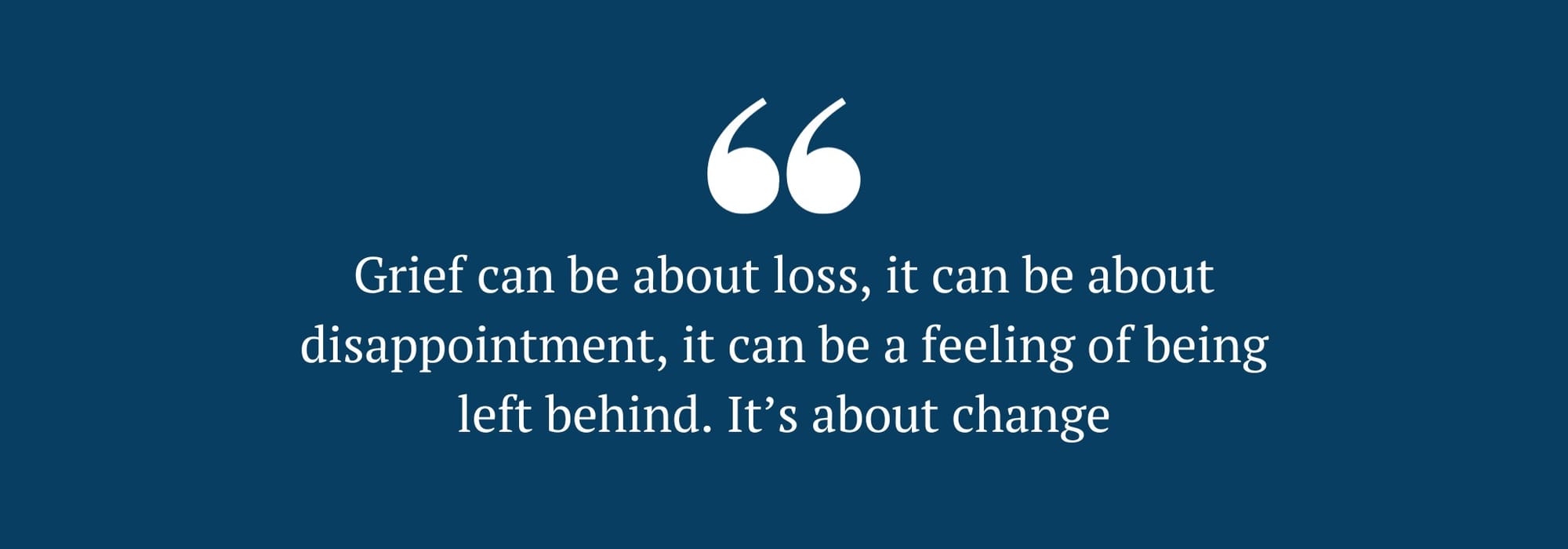How to be there for others when you're grieving, too
updated on Feb 16, 2024

One person shares her story of bereavement
My Nana was the life and soul of any party. Demure yet feisty, she could make you cry with laughter. A trusted and dependable listening ear for family and friends, she was also a volunteer with the charity Samaritans for almost 40 years.
For as long as I can remember, she would quietly pop out of the house, including on Christmas day, calling out, “I’m just off to Sam’s, you won’t notice I’m gone”. For years, my cousin thought she was off visiting a friend called Sam! But in reality, she was a listening ear for those in crisis, helping countless people in need. From telephone boxes to computers and email, my Nana witnessed great change in the incredible service. She was nothing short of brilliant.
As somebody who had never experienced a close bereavement before, the months after my Nana died were utterly confusing. One thing I did know, however, was that I couldn’t bear to see my family upset. But, as identified in research conducted by Cardiff University’s Marie Curie Palliative Care Research Centre and the University of Bristol, many people struggle to get the support they need while grieving, particularly since the pandemic.
In fact, the 2021 study found that 39% of respondents reported difficulties getting support from friends and family, often due to “relational challenges, little face-to-face contact, and disrupted collective mourning”. Additionally, more than half experienced high or severe vulnerability in their grief.
Although there are some great resources available for supporting others, most are for those not close to the bereavement. So, what about that missing piece of the puzzle: how to support others when you’re grieving the same person?
Elizabeth Jamieson, an experienced therapist who works in different areas including bereavement, explains that following bereavement, we sometimes seek a more communal, collective memory. While this can be comforting, individual memories are also important.
“Hold on to your own things when you support people, and allow them to hold onto theirs. Share things they might not know. But allow yourself to laugh about things that are funny. Don’t lose that bit of it,” Elizabeth says.
There are different types of memories, and Elizabeth points out it’s OK to compartmentalise. “You have the thing you do as a family where you support, you love, you help them remember. But also, there are your own memories, your own experiences, and that is very much for you.”
Grief is everywhere
Soon after my Nana died, my sister moved away to university, which I found difficult. It almost felt like a further loss. The distance was hard, and I was worried my sister wouldn’t feel supported over FaceTime.
Elizabeth explains that although we typically discuss grief in a bereavement context, we grieve many things. “Grief is everywhere. Grief can be about loss, it can be about disappointment, it can be a feeling of being left behind. It’s about change.”
She also says never to underestimate the value of connection, even if it’s virtual – “As much connection as possible, in small ways, in big ways.”

How to handle ‘firsts’ without them
Occasions like the first birthday and Christmas without your loved one can be particularly difficult times to support each other, while also grieving personally. Elizabeth says you should never feel guilty for not doing traditions and things you’ve always done previously. “It doesn’t mean that you won’t do it next year. Perhaps it just means that this year, it was too hard.”
Elizabeth recommends honouring the person you’ve lost in simple ways. “For their birthday, go to their favourite cafe, have their favourite cake, talk and remember and share those thoughts. Not forcing it.”
We did this recently, and when we were sitting eating fish and chips at my Nana’s favourite seaside café, Stevie Wonder’s ‘Isn’t She Lovely’ played – a song we associate with her.
Grief as a process
“In the old days, we used to talk about the stages of grief. And I think perhaps that’s not quite as respected as it used to be,” says Elizabeth.
She’s referring to psychiatrist Elisabeth Kübler-Ross’s five stages of grief: denial, anger, bargaining, depression, and acceptance, published in 1969. While the stages became applied to grief more generally, Kübler-Ross had been writing in the context of a terminal illness. So, when people criticised her idea of grief as linear, she clarified in her 2005 book, with David Kessler, that these were things people may experience, in any order.
Elizabeth highlights how important it is to recognise that grief isn’t linear. She says, “You can look at somebody, and you can think they’re moving along nicely. It’s almost like they’re following a path. And then there’s a backwards step.” That could be having to tell someone who doesn’t know yet – it could be anything – but it feels like the grief hitting you all over again.
“It’s not that the person who grieves the longest loved the most,” says Elizabeth, which is an important note: grief isn’t a competition, and we all process and display emotions differently.
She also reminds us that anger is normal. “There’s anger about what happened,” Elizabeth says. “There can be anger towards that person, which is very uncomfortable anger. Anger for leaving you. Anger for leaving you to have these feelings, anger for leaving you to have to deal with stuff. Anger at other people.”
I’ve found the ‘Growing around grief’ model helpful. Introduced by Dr Lois Tonkin in her 1996 article “Growing Around Grief: another way of looking at grief and recovery”, published in Bereavement Care, it suggests your grief doesn’t get smaller, your life just grows larger around it. Based on diagrams drawn by a mother whose child had died years prior, of a circle which remained the same size (the grief) inside another circle which increased (life), it demonstrates how the grief doesn’t diminish, but life goes on and expands around it.
I’ve also recently read about ‘Continued Bonds’. Theorised by Dennis Klass, Phyllis R Silverman, and Steven L Nickman in the 1996 book Continuing Bonds: New Understandings of Grief, it rejects the dominant grief model of the time, which viewed grief as linear, and pathologised the idea of continuing a bond with the loved one. Their research underlines the importance of remaining connected, recognising that grief evolves, is ongoing, and that these connections are normal.
“Every time we talk about that person, we continue to make those neuropathways, we continue to deepen those connections,” Elizabeth says. “So, we can continue to have a relationship if we acknowledge that person, even though they’re not there bodily.”

Accessing help
Supporting others through your own grief may feel like being pulled in different directions. So, it’s vital, Elizabeth says, to have time and space to express yourself outside of the immediate family group. Accessing therapy can be extremely helpful.
Grief has no time limit, and what some people may find comfort in, others may not. Acknowledging that can be helpful. And as Elizabeth reminds us, there are different kinds of memories, from collective, to group, and personal.
“Enjoy those group memories. But keep your own precious, keep your own dear,” says Elizabeth.
Your feelings are valid, and it’s crucial to give yourself space to keep all the memories going.
Cruse Bereavement Support: Helpline, webchat, and further support and information. (cruse.org.uk)
AtaLoss: Bereavement resources and signposting to lots of different support. (ataloss.org)
Child Bereavement UK: Support for children, young people, parents, and families when a child is grieving, or when a child dies. (childbereavementuk.org)
The Compassionate Friends: Support, information, and signposting for different bereavements. (tcf.org.uk)
Survivors of Bereavement By Suicide: Support lines, groups,
and information for those bereaved by suicide. (uksobs.org)

